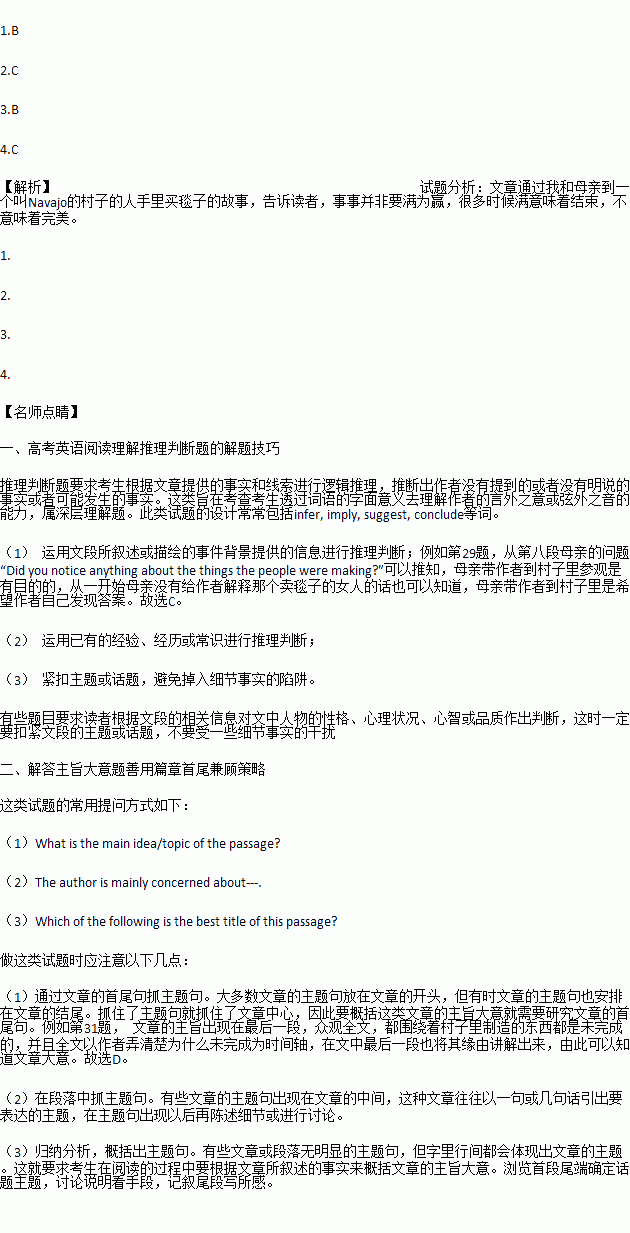ÌâÄ¿ÄÚÈÝ
That woman carried a new blanket (ë̺) over her arm. Wordlessly, she gave it to me.
¡°Is it finished?¡± I asked.
She shook her head. ¡°No. It is ready,¡± she replied. I handed her the money and took the blanket.
¡°It is beautiful, so skillfully woven (±àÖ¯),¡± I said to my mother. ¡°But what did she mean when she said it was not finished? How can it be ready if it is not finished?¡±
¡°I will tell you later,¡± my mother said, ¡°but first I will take you to the Navajo(ÄÉÍß»ô) village.¡±
We went down to the village. A group of young men were making sand pictures. We walked through the whole village, watching the different things the people were doing.
It was not until that evening that my mother finally explained the Navajo woman's words.
¡°Did you notice anything about the things the people were making?¡± my mother asked.
¡°What should I have noticed?¡± I looked at her and asked.
¡°Each thing the Navajo make has one small part that is not complete. The designs in their sand pictures are often not perfectly done, for example ¡ªthe line of a circle may not quite close. If you look carefully at your blanket, you will probably find a stitch (Ò»Õë) missing.¡±
I took the blanket off, but it looked as perfect as any design could be. Then suddenly, I noticed that sure enough a stitch was missing!
¡°But why do the Navajo intentionally leave some tiny part unfinished?¡± I asked.
¡°They believe that when anything is completed or finished, it means the end has come ¡ª it will not be perfect until then. Then too, with a circle, they believe that they must leave a pathway for the bad spirits to run away and the good spirits to come in. So, often, they do not make the line close.¡±
1.The blanket the author received _____.
A. was poorly woven B. made her think a lot
C. cost her a lot of money D. was finished, but not ready
2.Why was the author shown around the village?
A. To buy more things made by the Navajo.
B. To make friends with some of the Navajo.
C. To have a deeper understanding of the Navajo.
D. To look for the woman who sold her the blanket.
3.Which of the following may the Navajo believe?
A. A stitch in time is very important. B. Life only becomes perfect when you die.
C. He who makes no mistake is a perfect man. D. You must always try to make your life complete.
4.What's the main idea of the text?
A. The Navajo are good at making things.
B. The Navajo are brave and hard-working.
C. A blanket tells a lot about the Navajo culture.
D. Skills are needed to do business with the Navajo.
 È«ÄÜÁ·¿¼¾íϵÁдð°¸
È«ÄÜÁ·¿¼¾íϵÁдð°¸ Ò»¿ÎÒ»Á·¿Îʱ´ï±êϵÁдð°¸
Ò»¿ÎÒ»Á·¿Îʱ´ï±êϵÁдð°¸

 )£¬²¢ÔÚÆäÏÂÃæд³ö¸Ã¼ÓµÄ´Ê¡£
)£¬²¢ÔÚÆäÏÂÃæд³ö¸Ã¼ÓµÄ´Ê¡£